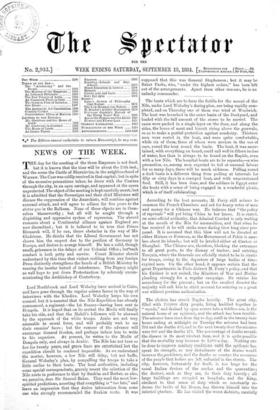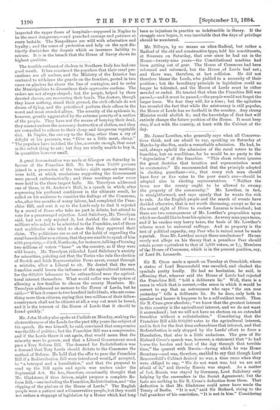The cholera has struck Naples heavily. The great city, filled
with 700,000 dirty people, living huddled together in " wynds," and drained by open sewers into a tideless sea, is the natural home of an epidemic, and the attack has been terrible. The seizures have risen from day to day, until in the twenty-four hours ending at midnight on Tuesday the seizures had been 794 and the deaths 493, and in the next twenty-four the seizures were 966 and the deaths 474. The per-centage of deaths reveals the disease in its most virulent form, and it is quite possible that the mortality may increase to 1,000 a day. Nothing can be done to improve sanitary conditions until the epidemic has spent its strength, as any disturbance of the drains would increase the.pestilence, and the deaths so overtax the resources of the people that bodies are left unburied in the streets. The city, however, fortunately for itself, is too large for the usual Italian devices of the cordon and the quarantine; the doctors, such as they are, do their duty bravely ; all large buildings are occupied as hospitals, aud the King, obedient to that sense of duty which so constantly re- deems the faults of his House, has thrown himself into the infected qaarters. He has visited the worst districts, carefully inspected the upper floors of hospitals—supposed in Naples to be the most dangerous,—and preached courage and patience at every bedside. The Neapolitans are wild with admiration and loyalty; and the sense of protection and help on the spot dis- tinctly diminishes the despair which so increases liability to seizure. It is in the breach that the House of Savoy shows its highest qualities.



































 Previous page
Previous page